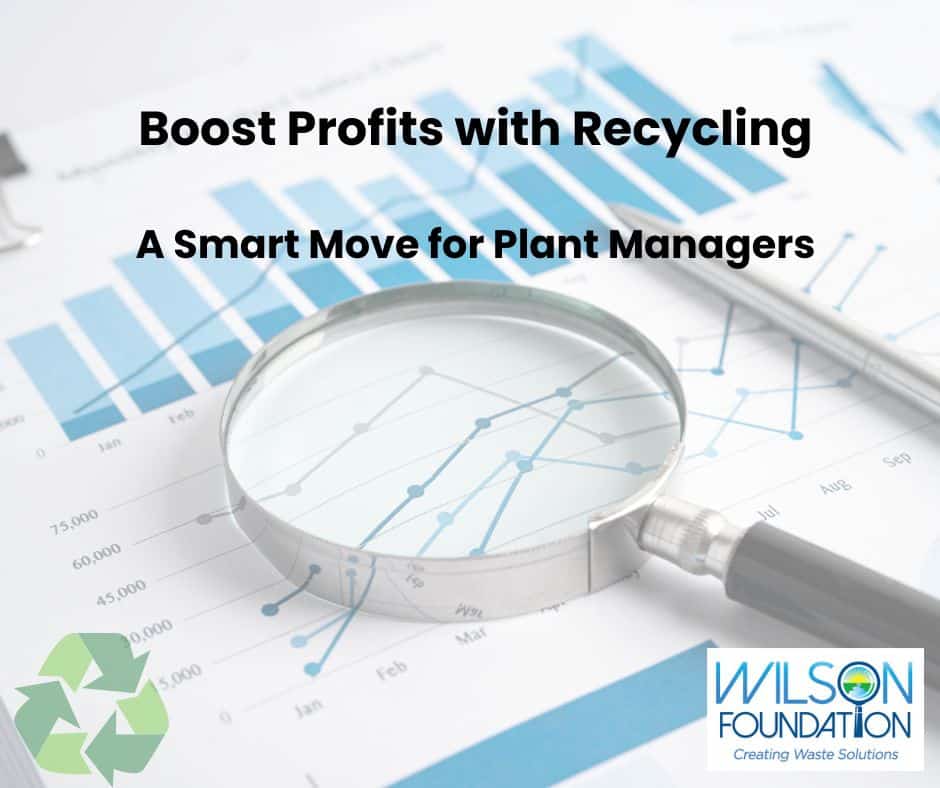Recycling is often praised for its environmental benefits, such as reducing landfill waste and conserving natural resources. However, its financial advantages are equally compelling and can significantly impact a company’s bottom line. As a result, it’s worthwhile to explore how recycling can lead to substantial cost savings, new revenue streams, enhanced operational efficiency, and other economic benefits for plant managers and EHS professionals.
Cost Reduction in Waste Management
Implementing a recycling initiative in your factory can drastically reduce the amount spent on waste management fees.
Recycling will reduce the volume of waste you send to landfills, leading to lower disposal costs. Additionally, with less waste to transport, you’ll save on transportation fees and fuel costs. This reduction in waste disposal costs can be a significant financial relief for the business, particularly if you have high volumes of waste.
Here is a recent case study in which recycling led to massive cost reduction. A client in Hamilton, AL, got a firsthand experience of how recycling can help save thousands of dollars. After partnering with Doxicom, they reduced the waste sent to landfill from 20.91 tons to 3.95 tons and saw their waste hauling invoice drop from $3,805.74 to $949. The swarf/sludge invoice was eliminated entirely, going from $5,763.32 to $0.
Savings on Raw Material Procurement
Recycling allows businesses to reuse materials within the plant, reducing the need to purchase new raw materials. Identifying and reusing recyclable materials cuts down on procurement costs. Moreover, recycled materials often come at a lower price than virgin materials, providing additional savings. This dual benefit of reusing and purchasing recycled materials will lead to substantial cost reductions.
Energy and Resource Efficiency
Using recycled materials often requires less energy than processing virgin materials, leading to lower operational costs and increased efficiency. Recycled materials generally consume less energy during the manufacturing process compared to virgin materials, resulting in significant energy savings.
Furthermore, using recycled materials reduces the need for natural resource extraction, cutting costs and improving supply chain management. This efficiency in resource usage contributes to overall cost savings and operational effectiveness.
Tax Incentives and Grants
Governments frequently provide tax incentives and grants to encourage recycling initiatives, which can offset the initial costs of setting up recycling programs. Many governments offer tax deductions or credits to businesses that implement recycling initiatives. Various grants are available to support the development and implementation of recycling programs.
Inflation Reduction Act (IRA) Tax Incentives:
The IRA includes provisions to support clean energy and recycling initiatives. Key incentives include:
48C Qualifying Advanced Energy Project Investment Tax Credit: This credit supports investments in facilities that produce renewable energy components and recycle eligible materials. Manufacturers can receive a base credit of 6%, which can increase to 30% if certain conditions are met. (IRS.gov)
45X Advanced Manufacturing Production Tax Credit: This credit supports the production of renewable energy components, including recycled materials. (Energy.gov)
Recycling Grants:
Various grants are available to improve recycling infrastructure and operations:
The Recycling Partnership Grants: These grants support community recycling programs, materials recovery facilities (MRFs), and processors. They offer funding for equipment, educational programs, and operational improvements for recycling various materials, including PET and polypropylene (The Recycling Partnership).
DOE Grants for Battery Recycling: The Department of Energy has awarded significant funding to projects that recycle battery materials and promote the circular economy within the energy sector (BDO).
Enhanced Brand Image and Market Position
Recycling initiatives can enhance a company’s brand image and market position by appealing to environmentally conscious consumers and differentiating the business from competitors. Consumers prefer companies with strong environmental practices, leading to increased sales and customer loyalty.
Promoting sustainability efforts can enhance a company’s marketing strategy, contributing to long-term business sustainability. Recycling initiatives can set a company apart from its competitors, providing a competitive advantage in the market.
Risk Mitigation
Recycling helps companies comply with environmental regulations, avoid fines and penalties, and prepare for future regulatory changes. Effective recycling programs can ensure compliance with environmental laws and prevent costly fines.
Proactive recycling initiatives also prepare companies for stricter future regulations, ensuring long-term material availability. This forward-thinking approach helps mitigate risks associated with regulatory changes and resource scarcity.
By implementing comprehensive recycling programs, plant managers and EHS professionals can achieve substantial cost savings, create new revenue streams, and boost overall operational performance. The economic advantages are clear and compelling, from reducing waste management expenses and lowering raw material procurement costs to gaining energy efficiencies and securing tax incentives. Furthermore, companies that embrace recycling can enhance their brand image, meet regulatory requirements, and mitigate future risks, positioning themselves as leaders in sustainability and innovation. Embracing recycling is not just an intelligent environmental decision; it’s a strategic financial move that can transform the bottom line and ensure long-term success in a competitive marketplace.

